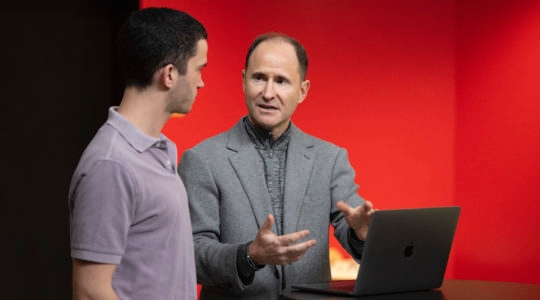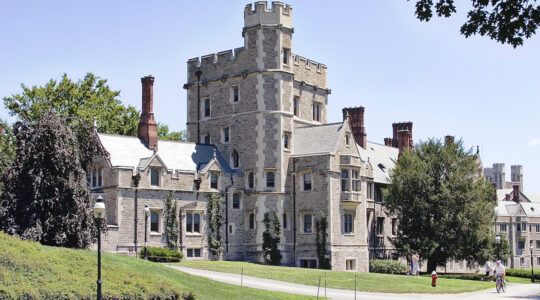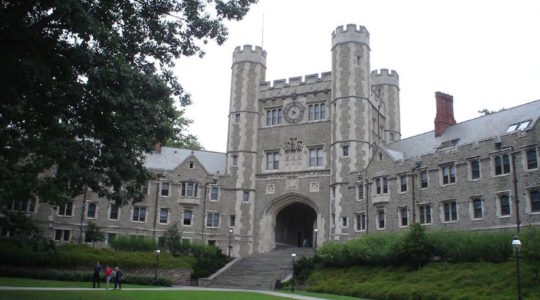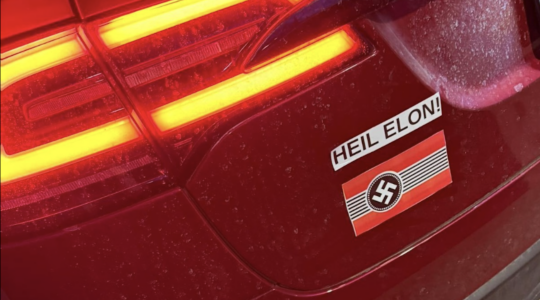PORT TOWNSEND, Wash. (JTA) – Soon after Robbie and Hilary Metzger moved to this small Pacific Northwest town in 1982, they wondered what to do on Yom Kippur.
“Why don’t we climb Mount Zion?” Hilary suggested.
Kids in tow, the Metzger and Saran families hiked up the mountain, fasting the whole time.
This Yom Kippur, more than 25 years later, instead of hiking the Metzgers will be at services. Before Rosh Hashanah, Robbie said he would co-lead the Rosh Hashanah and Yom Kippur prayers for about 100 worshipers at the Episcopalian Church, where the Bet Shira congregation now holds its monthly Shabbat and holiday services for the Jews of Port Townsend.
The Jewish community in this small town of 9,000 renown for its artistic individualism – “The place old hippies come to die” – is experiencing something of a boom with 65 unit-members at Bet Shira, more than 80 people at its Passover seder and 25 children interested in the relatively new Hebrew school.
Located on the Olympic Peninsula about 55 miles north of Seattle (and founded six months prior, in 1851), this lovely harbor town is not exactly the end of the world.
“But you can certainly see it from here,” quip the locals, who voted overwhelmingly for Ralph Nader in 2000 and are best described by the town’s bumper sticker: “We’re all here because we’re not all there.”
The town is not without its Jewish history. European immigrants with names like Katz, Waterman and Rothschild set up shop here in the mid-19th century, also giving Port Townsend a Jewish mayor.
The current Jewish community took root after Port Townsend revitalized in the late 1970s and early 1980s with the arrival of the artists, hippies and nature lovers. That’s when the Metzgers came from their Alaska homestead, where they had lived from 1972 to 1982.
The situation in Alaska was too much to handle, Hilary Metzger said.
“It’s one thing to have one child, but to have two – milking the goats while my toddler was eating goat berries – was too difficult,” recalled Metzger, who at 55 has the natural, rosy-cheeked look of many of the women here.
Soon after she arrived, Metzger realized she needed to give her two sons a Jewish education.
“We started having Sunday school for all the kids, and then the adults showed up, too,” she said.
For several years they all trekked to Seattle for the High Holidays until one year, according to Metzger, they said, “Why do we need to go anywhere else? Why don’t we do the holidays here?”
She helped launch and name the informal prayer group Bet Shira – house of song – with participants holding some of their first few High Holidays services in “The Palindrome,” the practice studio of the Flying Karamazov Brothers, then residents of Port Townsend .
Many Jews did – and still do – live in town, but how many is anyone’s guess.
“A lot of people you run into in town will say, ‘Oh, my husband is Jewish, my father is Jewish’ – someone in their heritage is Jewish, but they’re not interested in participating,” said Deb Bakin, who moved here with her husband, Jon, in 2000. He is now the shul president and she runs the burgeoning Hebrew school.
Plenty of people move to Port Townsend with no thought of searching out a Jewish community, but some end up gravitating to it nonetheless.
“What’s cool about this town is that we’re almost at the end of the country and it’s full of Jews, and they’re the misfits and that’s really very charming,” said Connie Segal, a 49-year-old esthetician and yoga teacher who left Austin, Texas, in 2004.
The soft-spoken healer found the Jewish community there “too conservative” for her taste, but “the Jewish presence in this town is comforting to me,” she said.
Segal said she would attend High Holidays services to commemorate her father’s death 11 years ago.
“I think he died on Yom Kippur because he wanted his kids to go to temple,” Segal said. “It feels like I need to show up.”
She adds, “I can go to services and then get a massage at 3.”
“Reluctant Jews,” is what psychotherapist Mark Saran terms some of the unaffiliated in Port Townsend. Saran, 58, says he “got dragged” here in 1982 from Seattle, where he grew up.
Sitting in his art- and plant-filled living room, wearing shorts and clogs despite the first September rain, he looks the laid-back part of Pacific Northwesterner.
“There were a lot of Jews who took part in the community because it was here,” he said of the early days. “If it hadn’t been here, they wouldn’t have sought it out.”
Saran remembers one of the community’s founding fathers saying, “As soon as you start charging dues, I’m leaving this congregation.”
That was the zeitgeist of the town: People didn’t want the Judaism they had left – large, organized, institutional. Back in the 1980s a woman offered to buy the Masonic Temple.
“I’m going to buy it for the Jewish community – will you maintain it?” the woman asked the Metzgers. But they thought the job would fall to Robbie, a contractor, so they declined.
“That was a mistake,” Hilary Metzger admits with a shrug.
When another opportunity arose to buy the Uptown Theater in the mid-1990s, the debate nearly “tore the community apart,” Metzger said.
In the end the community did not buy a building, and it also went through a “lull period,” according to Saran, especially after the children celebrated their b’nai mitzvot. (Metzger’s son was the first bar mitzvah on the Olympic Peninsula).
“Some of the forming families had put in a lot of years, and we just sort of … stopped,” Saran said. “The life started coming back six to eight years ago. The juice is the kids.”
If organized Jewish life is returning here, it’s due to families like the Bakins, who are the only family here to keep kosher – ironic given the pronunciation of their name. That was one of Bakin’s concerns when the family left Manhattan’s Upper East Side, as well as the lack of religious school.
“To some degree you have to adapt who you are,” Bakin said, surrounded by children’s drawings of Jewish holidays, a collection of antique menorahs and the congregation’s Torah, which lay on their couch wrapped in a white garbage bag to protect it from the rain. (The ark remained at the church.)
“I remember one woman who moved here and said she was shocked there was no religious school. ‘Shocked’ seemed like an unusual word – this town has whatever people in this town are willing to provide. I wanted kids’ programming, so I created it.”
Bakin helped start the Hebrew school, and hosts it at her house once a week. Some 25 children aged 3 to 10 expressed interest for this year. It will begin after the High Holidays.
“This is a do-it-yourself town” Bakin said. “This is a town where if you want it to happen, you have to make it happen. And that extends to the whole town.”
These days, Bet Shira leaders don’t do much outreach to unaffiliated Jews in Port Townsend.
“We tried outreach one year before I became president,” said Barry Lerich, 71, a retired Navy officer who moved to the nearby Marrowstone Island in 2001 and also is credited with revitalizing the community. “It just did not bring anybody in. Really, nobody.
“We tried to contact other Jewish people that we knew to see if they would join, and they had no interest. None.”
That’s fine with Bakin.
“We’re not really trying to grow,” she said. “My philosophy is we’re here if you want us and need us, and if it doesn’t work it’s fine.”
There are downsides to being part of a small, remote, liberal Jewish community. It’s not only the question of whether to buy a building or hire a rabbi. (“We once had a rabbi on the High Holidays and everyone hated it,” Metzger said.) It’s not only the issue of how to serve as a “big tent” for members with differing views (at the High Holidays this year the community is working on the balance between Renewal/Reconstruction elements and Conservative/Reform elements of the service). Taking any sort of pro-Israel political stand, given the peace movement’s pro-Palestinian bias here, is not even the biggest challenge.
The toughest question seems to be, “How do you raise Jewish kids here?”
That’s what elementary school principal Amy Fields had asked Metzger when Fields’ son started singing “Happy Birthday” when he saw her lighting Shabbat candles.
After that five families, including the Metzgers and the Bakins, committed to having Sabbath-eve meals every week.
“That’s a big commitment,” said Cynde Marx, 41, a financial consultant who moved to Port Townsend from Los Angeles 13 years ago. Coincidentally, her older sister had carpooled with Jon Bakin in elementary school.
With three kids now in the Hebrew school, Marx is more involved with Judaism than she had been in her younger days.
“I remember one Yom Kippur being in Winchell’s doughnuts with my Jewish boyfriend, and it was OK because we were both Jewish,” she said.
But now her husband has converted to Judaism, her Friday nights are occupied by Shabbat meals, her three daughters are in Hebrew school and her year is governed by the Jewish holidays.
“When I was living in Los Angeles, I never really thought about being Jewish, and here you really are making the time to be Jewish in a place where the majority are not,” Marx said. “I can’t imagine living anywhere else.”
JTA has documented Jewish history in real-time for over a century. Keep our journalism strong by joining us in supporting independent, award-winning reporting.





